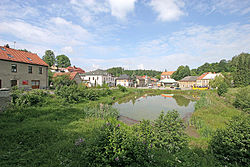| Nové Hrady | |
|---|---|
| Municipality | |
 View towards the Nové Hrady Castle View towards the Nové Hrady Castle | |
 Flag Flag Coat of arms Coat of arms | |
 | |
| Coordinates: 49°51′6″N 16°8′38″E / 49.85167°N 16.14389°E / 49.85167; 16.14389 | |
| Country | |
| Region | Pardubice |
| District | Ústí nad Orlicí |
| First mentioned | 1293 |
| Area | |
| • Total | 6.73 km (2.60 sq mi) |
| Elevation | 384 m (1,260 ft) |
| Population | |
| • Total | 308 |
| • Density | 46/km (120/sq mi) |
| Time zone | UTC+1 (CET) |
| • Summer (DST) | UTC+2 (CEST) |
| Postal code | 539 45 |
| Website | www |
Nové Hrady (German: Neuschloss) is a municipality and village in Ústí nad Orlicí District in the Pardubice Region of the Czech Republic. It has about 300 inhabitants.
Administrative parts
The villages of Mokrá Lhota and Rybníček are administrative parts of Nové Hrady.
Etymology

After the settlement was founded, it was called Boží Dům (i.e. "God's house") after the first church built in the area. When the old castle was replaced by a new one, the village was renamed Nové Hrady (literally "new castles").
Geography
Nové Hrady is located about 22 kilometres (14 mi) southwest of ústí nad Orlicí and 32 km (20 mi) southeast of Pardubice. It lies in the Svitavy Uplands. The highest point is at 470 m (1,540 ft) above sea level. The Novohradka River flows through the southern and western parts of the municipal territory. A system of fishponds supplied by the brook Hradecký potok is located in the village proper.
History
The first written mention of Nové Hrady is from 1293. At that time, the village belonged to the Litomyšl estate and shared its owner. A late Gothic castle was built on the site of an old castle in 1442–1468 by the then-owner of Litomyšl, Zdeněk Kostka of Postupice, and the Nové Hrady estate was established. The Gothic castle was rebuilt into a Renaissance residence in the 15th century, but during the Thirty Years' War, it was looted and destroyed by Swedish army.
Nové Hrady saw its rise in the 18th century. In 1750, the French aristocratic Harbuval de Chamarè family bought the estate and had built the Nové Hrady Castle. The family gradually became poorer, so at the beginning of the 20th century, they sold the estate.
Demographics
|
|
| ||||||||||||||||||||||||||||||||||||||||||||||||||||||
| Source: Censuses | ||||||||||||||||||||||||||||||||||||||||||||||||||||||||
Transport
There are no railways or major roads passing through the municipality.
Sights

Nové Hrady is known for Nové Hrady Castle. It was built in the Rococo style in 1773–1777, in the style of French summer residence. The castle is nicknamed "Czech Versailles" and "Little Schönbrunn". The building is unique within the country for the style in which it was built and because it was never rebuilt. It is privately owned, but it is open to the public and offers sightseeing tours. The castle is surrounded by several gardens and with and English-style park, in which a hill with ruins of the former Gothic castle is located.
Other sights include the Church of Saint James the Great, built in the Baroque style in 1724, and the Stations of the Cross in the English park from 1767.
References
- "Population of Municipalities – 1 January 2024". Czech Statistical Office. 2024-05-17.
- ^ "Obec" (in Czech). Obec Nové Hrady. Retrieved 2022-06-20.
- "Znáte Nové Hrady, Boží dům, Versailles a Schönbrunn v jednom?" (in Czech). CzechTourism. Retrieved 2022-06-20.
- ^ "Historie" (in Czech). Obec Nové Hrady. Retrieved 2022-06-20.
- "Historický lexikon obcí České republiky 1869–2011" (in Czech). Czech Statistical Office. 2015-12-21.
- "Population Census 2021: Population by sex". Public Database. Czech Statistical Office. 2021-03-27.
- "Zámek Nové Hrady ve východních Čechách – navštivte České Versailles" (in Czech). CzechTourism. Retrieved 2022-06-20.